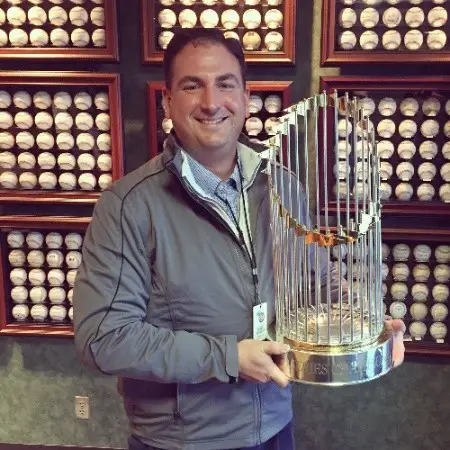
An Inside Look at How Iowa Cubs Manage ‘Circus’ of Minor League Travel
From the Dominican Republic to urban Little Leagues to farm towns, all baseball players dream of The Show. That’s the big time. The place where the major-league lights literally and figuratively shine brightest – be it for a cup of coffee or a 20-year career.
But to make The Show, minor league players must do more than just develop major league talent. They must also survive what can be called “The Circus.” For a Triple-A team like the Iowa Cubs, that means at least 70 road games a year that force them and thousands of pounds of team equipment to continually crisscross the country at all hours of the day in planes, buses, and trucks.

“Circus is a good word for it,” said Randy Wehofer, who as vice president and assistant general manager of the Iowa Cubs oversees every part of putting the team on the road. “There are just so many moving parts. We’re at the mercy of minor league budgets, extra innings on getaway days, weather, commercial flight schedules and mechanical issues.”
Managing this circus is no small task. This past week, Cubs Insider caught up with the I-Cubs on the road for their four-game series that started Thursday night in Sacramento. So far this season, the I-Cubs have journeyed about 17,000 miles. By season’s end, they will have logged more than 1,600 hotel-room nights and 24,000 miles, or just short of the Earth’s circumference.
The Circus is especially tough to endure in the 16-team Pacific Coast League (PCL). PCL teams stretch throughout three of America’s four main time zones. By comparison, the International League – home to baseball’s 14 other Triple-A affiliates – contains all its travel within just the Eastern Time Zone. And unlike the charter-plane travel in the major leagues, in the minors it’s all commercial flights, long security lines, and folding big frames into 31 inches of leg room.
At any one time, the PCL can have 560 players, team staff and broadcasters in the air or on the road heading to their next scheduled series. And thanks to airlines now charging for checked baggage, those teams will often truck their equipment to the next city separately to save money and eliminate any chance of lost uniforms or helmet bags.
So while baseball remains the name of the game, managing The Circus is its own unending logistical puzzle.
** **
Wehofer’s 19-year career in the minors exemplifies how most minor-league employees wear many hats.
“With the [Single-A] Burlington Bees, we had a full-time staff of just four. I did pretty much everything except pour beer. I was the broadcaster, official scorer, did media relations, pulled tarp, handled sales,” Wehofer said. “In the off season, I even did painting and maintenance in the stadium.”
This continued when he moved up the minor-league ladder nine years ago to the Iowa Cubs. While broadcasting all 140 of the team’s games, he also handled ticket sales, branched into marketing, and coordinated travel on the road along with the team trainer.
When promoted last year to Iowa’s assistant GM, Wehofer gave up his broadcast mic. This freed him from 75 days on the road away from his family, but also fully introduced him to all travel planning that starts a few weeks after the World Series.
“The next year’s schedule is usually out by August, but teams don’t set exact game times until November,” Wehofer explained. “Once we have those, we take the schedule and ask, ‘Are we going to play a day game and then head directly to El Paso? What is the latest flight we can get on April 9 to get to Nashville? What does that cost and how many seats can be reserved?’”
Wehofer then sits down with the team’s travel agent for the past 10 years, Rick South, owner of the Travel Center in Des Moines.
“It’s a fun puzzle to put together,” South said. “In the off-season, the maximum airlines let us reserve are about 30 to 36 seats because most Des Moines flights seat 100 or less. This means we’ll often will need to buy more tickets later, but that’s our starting point.”
South said he books all tickets one-way because players are regularly promoted and moved mid-road trip, and the Transportation Safety Administration (TSA) won’t let anyone travel on a ticket issued in someone else’s name.
The PCL also has rules to follow. A big one is no team should reserve a getaway flight that’s less than six hours after the scheduled first pitch. This provides wiggle room if weather starts a game late or the game goes long. So while teams may wish to save every travel dollar possible, if they cut things too close and contribute to a game cancellation, the league fine is $250,000.
During the off season, Wehofer also studies when best to travel by bus. Some choices are easy. Des Moines to Omaha is a two-hour drive. The team usually hires sleeper buses with fold-out cots for the nine-hour overnight drive between Nashville and Memphis. When other options aren’t as clear-cut, he polls I-Cubs Manager Marty Pevey and the team trainer for their preferences. (On most PCL teams, a trainer serves as the principal road coordinator, pumping out road-trip itineraries and handing out the cash per diems on arriving at their first hotel).
Winter is also about determining when to schedule the trucks for shipping team equipment. Players can bring one carry-on aboard the flight with personal effects, but this leaves another 60 pieces for shipping. These includes bats, helmets, uniforms, video cameras, footage-logging equipment, and multiple trunks for the team trainers.
“Home teams only have to provide a basket of balls for batting practice,” Wehofer said. “Most visitor clubhouses today will also have some basic weights, exercise balls and resistance bands. The rest is on us.”
Daniel Emmons, manager of baseball operations & communications for the Sacramento River Cats, loves the trucking innovation. Trucks break down less frequently than planes, and when flights into smaller airports like Fresno and El Paso get canceled, finding alternate flights able to accommodate both the team and equipment can be a heavy lift.
“The only negative with shipping comes when a player is promoted on an off-day, and the equipment truck has already left,” Emmons said. “Then the player has to use loaner bats and helmets until the truck catches up with us, and we can send their equipment on.”
** **
Back in April, Anthony Rizzo voiced his desire to shorten the 162-game major league regular season. By coincidence, the I-Cubs and the entire PCL earlier that month began their first shortened regular-season schedule. Going from 144 to 140 games gives players extra off days and teams extra travel flexibility, especially when going from one end of the PCL to the other.
This is especially helpful for the I-Cubs, as they travel with one of the largest road contingents in the league. This is generally no fewer than 35 players and staff, starting with the 25-man active roster. Add in eight field staff – manager, pitching coach, two hitting coaches, strength coach and three trainers. Then include the video coordinator, radio broadcaster, any players on the DL traveling with the team, and an occasional interpreter.
By comparison, Sacramento travels with two fewer field staff and no video coordinator. Plus, the Cubs’ major league organization is one of the few in baseball to pay for a nutritionist for each of its affiliates. The nutritionist plans a healthy menu for every home and road game, and even joins the team for one road trip each year.
“At the lower levels, you hear about players getting by on peanut and jelly sandwiches,” Wehofer said. “But the Cubs feel they want to better protect their player investments. The players do have input into the menu because the last thing you want is for the players to pass up a healthy meal and then hit a fast-food outlet.”
From a logistical perspective, each body on the road means one more airline ticket that needs to be written and issued – and re-written when travel snafus arise. I-Cubs travel agent South said this is when the travel planning gets hairiest.
“As we get closer to each road trip, we start buying any extra tickets needed,” South said. “We input all names into the reservation system, but then we usually need to update these several times before departure as the roster keeps changing.”
That’s no small chore. For instance, the I-Cubs roster has had 126 individual changes so far this year. Sacramento is nearing 200 transactions. Plus, get even one letter wrong on a ticket or leave a maternal surname off a Hispanic player’s ticket, and TSA has the right to bar them from boarding a flight.
But one travel change that’s always welcome comes when a player is promoted to the majors. In these instances, the first member of the Iowa staff that the big club contacts is not the manager or the GM or even Wehofer. It’s the team trainer, who must immediately log onto the Cubs’ online system and quickly lock in the travel arrangements.
As usual, The Circus demands its due. The manager gets the second call.
** **
A shrewd reader at this point may be wondering, “What about hotel reservations?”
Interestingly, no road team handles their own hotel reservations. That falls to the home team, a practice that allows them to develop a long-term relationship with a single hotel operator and negotiate a bulk-rate discount covering 70 home dates. As a road trip approaches, road teams then inform the home team how many total rooms are needed and the names of their traveling staff and players.
Every home team must also send a representative to meet each road team when they arrive at the airport (or hotel if coming by bus). The home team arranges all transport to and from the airport and ballpark. They also must see each road team off in case any travel snags develop and the road team needs an extra pair of local hands to solve the issue.
Emmons said this happened last year when a canceled connecting flight through another city threatened the departing team getting to a sold-out game that night. Both teams sprang into action, leveraging all their airline contacts. Ultimately, the airline agreed to fly an empty plane cross-country, collect the team and fly them direct. A bus even met the team plane on the tarmac to whisk everyone to the stadium on time.
Each year during the PCL’s annual winter meetings, travel even gets its own four-hour breakout session. All 16 teams share novel situations, innovative solutions, useful new relationships, and the latest carrier info in individual markets.
Wehofer acknowledges that the complicated logistics of a minor league road schedule pose a challenging lifestyle for players and staffers alike. But most recognize the carrot hanging before them. Get to The Show, and the travel gets a lot easier with all the chartered planes and luxury hotels.
“When someone complains about the travel, our running joke is to rib them and say, ‘You don’t like it, play better,’” he said. “Same goes for broadcasters and trainers. ‘You don’t like it, broadcast and wrap ankles better.’”

